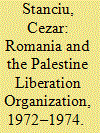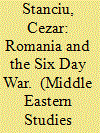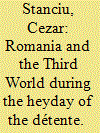|
|
|
Sort Order |
|
|
|
Items / Page
|
|
|
|
|
|
|
| Srl | Item |
| 1 |
ID:
121418


|
|
|
|
|
| Publication |
2013.
|
| Summary/Abstract |
Nicolae Ceausescu of Romania was well-known during the Cold War as a non-conformist voice in the Communist bloc, especially because of his opposition to the Soviet Union and spectacular foreign policy initiatives. But was that line Ceausescu's creation? This analysis examines the sources of Romania's dynamic and autonomous foreign policy in the Cold War and shows that the origins of this foreign policy can be traced back to Ceausescu's predecessor, Gheorghe Gheorghiu-Dej. The shock caused by de-Stalinisation and Nikita Khrushchev's reformist policies saw the Romanian party leadership limit its dependence on the Soviet Union, both politically and economically. Romania's foreign policy experienced a revival starting from the tumultuous moments when Gheorghiu-Dej listened to Khrushchev's Secret Report at the 20th Congress in February 1956. Fearing the loss of his position in power, Gheorghiu-Dej saw relations outside the Communist bloc as a source of stability.
|
|
|
|
|
|
|
|
|
|
|
|
|
|
|
|
| 2 |
ID:
180039


|
|
|
|
|
| Summary/Abstract |
This article reassesses Nicolae Ceaușescu’s relations with Yasser Arafat and the Palestine Liberation Organization in the first years after their first contact in 1972. Romania pursued an active policy in the Middle East conflict from 1967 onwards, trying to help establish contacts and carry messages between the parties involved, motivated by its anti-hegemonic foreign policy which considered that the conflict was the product of superpower rivalries in the region. In what concerned the Palestinian problem, Romanian decision-makers believed that the establishment of an independent Palestinian state, regardless of its territory, was the key to solving the conflict. In Ceaușescu’s view, both the PLO’s close ties to the USSR and its terrorist activities derived from the absence of statehood and once a Palestinian state was created, its struggle would have moved to a different level, facilitating negotiations and peace arrangements. Ceaușescu strongly advocated in favor of this vision during its contacts with Arabs, Israelis and Americans, trying to convince all sides of the advantages of such a scenario. This way, Romania contributed – as small as that contribution may had been – to the transformation of the PLO from a virtually terrorist organization into a future political actor in the region.
|
|
|
|
|
|
|
|
|
|
|
|
|
|
|
|
| 3 |
ID:
133530


|
|
|
|
|
| Publication |
2014.
|
| Summary/Abstract |
In June 1967, when the Soviet Union and its Warsaw Pact partners decided to break off diplomatic relations with Israel following the outbreak of the Six Day War, it came as a surprise to many that Romania refused to do the same. This paper investigates previously unpublished documents in order to retrace the decision-making process in Bucharest and offer a rational answer to the question: why did Romania choose to ignore Moscow's decision? Was it a demonstration of support for Israel as it appeared at the time and, if so, what were the reasons behind it? Archival insight demonstrates that Romania's decision to maintain diplomatic relations with Israel can best be understood in the general framework of its relations with Moscow. Striving to gain autonomy in the Communist bloc and fight off Soviet domination, Romanian decision-makers preferred to engage in their own analysis of the events in the Middle East before assuming one decision or another. Their conclusions led them to believe that Moscow's policy had been adventurous and to break relations with Israel would have implied confirmation and reinforcement of Moscow's role in the Middle East.
|
|
|
|
|
|
|
|
|
|
|
|
|
|
|
|
| 4 |
ID:
163073


|
|
|
|
|
| Summary/Abstract |
All Warsaw Pact countries developed intense relations with Third World countries during the 1970s, following in Moscow’s footsteps, allegedly supporting the struggle against Western imperialism while making profitable arms deals. One Warsaw Pact country, though, saw things differently: it was both American and Soviet imperialism that had to be fought off. This paper reassesses the origins and nature of Romania’s Third World policy in the context of the Soviet–American détente of 1972. Détente was perceived in Bucharest as a risk to the country’s independent foreign policy and a consolidation of the existing bipolarity which is why Romania tried to mobilise small and medium states of the Third World in a fight against hegemony and underdevelopment. Although they adhered to the developmental debates and tried to join the Group of 77, the Romanians viewed underdevelopment not necessarily in structural terms but rather as a product of political obstructions exerted by the superpowers. Refusing the take the Soviet side in the Third World, Romania tried to convince Third World leaders that unity and cooperation among the ‘unprivileged’ were a shield against foreign interference and a guarantee of development.
|
|
|
|
|
|
|
|
|
|
|
|
|
|
|
|
|
|
|
|
|